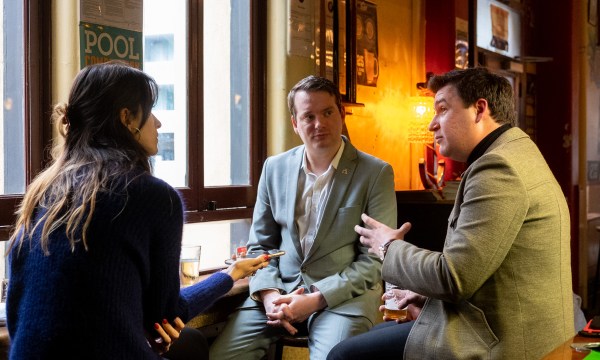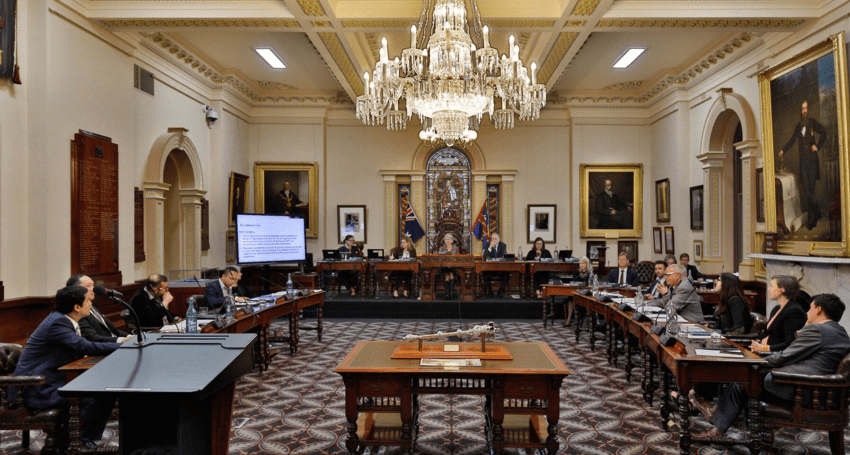Reporter Angela Skujins started covering the capital city local government round in 2020 – half-way through its term – and immediately felt the burden of late nights, in-fighting and one particular shih tzu.
Two years observing the Adelaide City Council
The pixelated, beady eyes of a fluffy shih tzu – a cute breed to some, miniature terrorist for others – bored into this reporter from an Adelaide city councillor’s laptop screen in Adelaide Town Hall one 2020 evening.
Note: This is an opinion piece.
I had been recently tasked to cover the publicly elected Lord Mayor and 11 councillors, and the weighty decisions they would make on behalf of city ratepayers. Over the next two years the chamber would debate issues from bike lanes to car parks to park lands to a Teeny Arena (basketball stadium), the latter of which resulted in a spectacular backflip.
The pup-fawning councillor, who we’ve decided not to name, was looking at the portrait of the canine for roughly 30 minutes. I was sitting behind them, looking at them looking at the dog, while other councillors debated the merits of a motion.
This dog and what it represented – a distraction, drawing attention away from motions and important decisions – was a major theme in the second half of the Adelaide City Council term. It was an omen of what was to come.
But it wasn’t just about the councillors who spent their town hall time scrolling on their iPhones or sleeping (yes, this actually happened) or chewing the fat by typing incessantly on web chat forums rather than doing the $7000-quarterly paying job expected of them.
The distractions also included the corridor confrontations and headline-grabbing remarks which drew the public’s attention away from the (more beige) bread-and-butter motions, such as the introduction of Flower Day or the toy library.
Lord Mayor Sandy Verschoor derided the media in the past for using “inflammatory” headlines and allegedly misrepresenting the Adelaide City Council. Several councillors have lambasted this reporter over text and social media also for what we’ve covered, topics which include the less-powerful elected members finding themselves in control of the chamber or public arts policy changes.
They inferred we created these distractions that led the public astray. But these stories don’t materialise out of thin air; without elected members saying inflammatory things, such as they would “boot off” adversaries from committees, these stories wouldn’t exist.
We raise these issues, on the eve of a newly elected Adelaide City Council, because to improve you need to learn from the past. The reality is that my observations covering the second half of this term is that the elected body has been riddled with problems and plagued with very of-the-moment workplace complaints: dysfunction and toxicity.
Maybe these distractions – spanning sleepy to heated – were an unexpected by-product of meetings stretching well past midnight. A late 2019 decision to scale back the number of monthly council meetings from two to one led, unsurprisingly, to a larger agenda.
Or maybe (read: most likely) the distractions were caused by bickering between the Team Adelaide majority faction and independent minority group, whose infighting has carried-through to this near-over election campaign.

Journalist Angela Skujins interviewing incumbent councillors Keiran Snape and Alexander Hyde. This picture: Johnny von Einem
But what we do know is these distractions almost overshadow a four-year period of decision-making that failed to deliver an east-west bikeway before deadline, and an administration that built a playground, dedicated for children with a disability, that was not DDA (Disability Discrimination Act) compliant.
While all councillors over the past two years decried “bullying”, the elected body did deliver a generous COVID-19 Reignite Adelaide relief package, a steel Pigeon, and dabbled in property development at the old Le Cornu site and Central Market Arcade. There are, of course, other goings-on which didn’t get much attention. For example, Adelaide Town Hall is currently staffed with less-than-optimal levels of Aboriginal and Torres Strait Islander employment – as of 30 June 2022 it sat at 0.85 per cent, which is half of the 2 per cent target.
Something else that for a long time slipped under the public’s radar was the postcode 5000’s never-ending e-scooter trial that was guided by no legislation governing the “trial’s” success.
What I’ve learnt from speaking to a small sample size of candidates in this upcoming Adelaide City Council election is that many of them are determined to be undistracted.
After also observing the past term of council troubles, many of them want to wipe the slate clean. This includes culling in-fighting and internal politics, and prioritising things like safety, electric vehicle infrastructure and greening.
They appear to have tunnel vision – hopefully not for a small dog on their computer screen.
Voting in this year’s local government elections closed yesterday, ahead of Saturday’s scrutiny and count.




